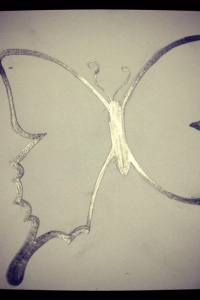
When the fog cleared, I thought I would be able to see a little better. A weak, piercing ray of sunlight found my right eye, and locked into place like a laser. The space between the lens in my glasses and my right eye flooded with a kaleidoscope of color.
Unless I went backwards into the cold waters of the cove off the Atlantic, I had no choice. I walked unsighted up the mixture of rock, sand and wild grass. The lighthouse flickered in between my right eye and the lens, disappeared and re-appeared, like a mirage.
My duty was done. He was floating with the seaweed, plastic waste and the occasional hardy shallow water fish. Some of him would dissipate in the ocean, and languidly sink to the ocean floor amongst the plankton and the algae, while some would be trampled underfoot on the shore by human and animal scavengers.
I literally dusted my hands of him. But what stood ahead was still far from clear.
My car was parked in a lay-by designated for tourists and picnickers to use in more clement weather than today. Apart from a Mobile Home, mine was the only vehicle in the parking lot today. I drove back to my hotel in Halifax. My flight back to Toronto was at noon the next day. The empty urn sat in the passenger seat to my right as I drove. I wondered if parts of him still clung to the insides of the urn. I should have dipped the urn in the waters of the Atlantic and rinsed it clean of him.
As the country lane I was on merged with the highway to Halifax, I glanced in the rear view mirror and caught sight of my own face. My eyes stared lifelessly back at me. My cheeks showed signs of sagging, and there were folds of loose skin under my eyes. I looked over 50, I thought to myself, and forty was still a couple of years away. My skin was dark, almost brown and freckled. My eyes were too large for my face, and my nose looked like a sculptor had forgotten to finish it. My lips were thicker than I would have liked, and my jaw more angled than I would have liked.
I handed the car keys in at the rental desk at the hotel, and signed a few more forms. I went up to my room, and ordered soup from room service. After splashing water on my face, and resisting the urge to have a hot shower right away, to wash every trace of the erstwhile occupant of the urn from my body, I called Ivan.
It’s done
He grunted and disconnected. Ivan was a man of few words.
I could barely eat a few spoons of soup. I laid the tray on the floor outside my room, and stretched out on the bed. I leaned my head against the pillow and closed my eyes, and contemplated my return tomorrow. It seemed like journey’s end, although it should feel like a new beginning. But it also seemed a fitting end to another journey that began almost 25 years ago.
********
Saroja was 13 years old when her father died. With him she lost the only true friend and mentor she had. He left her his collection of classic literature and poetry, which filled two large cartons. They lived in the sleepy town of Bargarh in the eastern state of Orissa in India.
Her mother did not seem to take too long to get over her husband’s death. In fact, after living with her brother for less than a year, along with Saroja, as unwelcome guests, she decided that the best course of action for her was to find another husband and use him as a means of supporting herself. Her brother and his family enthusiastically supported the idea. Saroja as a rebellious 14 year old opposed the idea tooth and nail. She did not want another father, and made no bones about it.
It took a visiting aunt to make Saroja realize that she was a liability to her mother after her second marriage. The aunt, who was fond of Saroja as she was of Saroja’s father, told her that plans were afoot for an early marriage to an older man, who was a widow and would pay handsomely to have a young girl as pretty as Saroja. The aunt advised her to escape before this happened. She also helped Saroja to plan her escape and provided her enough money to execute her plan. At the tender age of 14, she arrived at Nizamuddin station in New Delhi on a steamy August day.
The man appointed by her aunt to meet her and find her a place to stay and study either did not show up, or was not able to find her. Saroja took just half an hour to realize that she was truly on her own now. Then began six weeks of dodging a large variety of touts, pimps and other such citizens from the darker side of Delhi. Eventually her knowledge of good spoken English landed her a job with a fast food restaurant, which hired her off the payroll, payments in cash, no questions asked. Saroja looked old enough to be 18, so there was no risk for her employers. The job was a temporary one and allowed Saroja to stop bleeding her remaining small reserve of cash.
Over the next four years she changed jobs, and places to live, at frequent intervals. She lost her virginity along the way, as well as any illusions about human nature. She did learn that she had a body that men wanted to possess, and eventually she learned how to use it to her advantage. A succession of grateful employers showered her with cash and gifts, so much so, that by the time she was 18, she had a tidy sum saved up in a bank deposit.
Her excellent command over English finally got her a job in a bookstore. She was tired of the medical stores and veterinarians’ shops she had worked in, as well as their lecherous owners. While they also served a purpose in her eyes, she still was relieved when she finally got a job that was, in her eyes, a little more respectable. The owner of the bookstore was a somewhat grumpy man of few words, but shared the same passion for books that Saroja had. The location of the store was also a world apart from her previous places of employment. It was located in a community center in one of south Delhi’s more upscale neighborhoods.
‘The gentry that comes here is a mixed bag,’ said Mr. Rai, the owner of the store. He was right. There were the scholars and the schoolchildren, the genuine book lovers, the ‘time pass’ people as Mr. Rai called them, the real freaks (Saroja actually heard one customer walk in and ask whether they stocked cigars), who provided either irritation or amusement, depending on their behavior. Mr Rai, a tall and formidable looking man was usually very abrupt with these visitors.
On her 19th birthday Mr. Rai presented Saroja with the latest book by Paulo Coelho. It was an embarrassing moment for her, as he was always so gruff and withdrawn. This gesture showed a human side to Mr. Rai, and made him more endearing to Saroja. Over the next few weeks Mr. Rai seemed to thaw some more. Although he could not be described as chatty, he did treat Saroja more cordially than before. She, in turn, brought food cooked by herself occasionally and shared it with him. He seemed happy enough to eat it. She did not even know if he was married, as he never seemed to talk to anyone from home, or refer to a wife or children.
Saroja had begun to feel a greater sense of well being over the last one year, almost as if things were finally settling down. She was relatively comfortable in her small one room set in one of many ‘laldoras’ in south Delhi. Her neighbors were quiet and she began to feel at peace with her lifestyle. She was no longer subject to sexual harassment at work or anywhere else for that matter. Then one day, one of her neighbors, a travel agent who specialized in Gulf travel met her on the stairs, and changed her life forever.
************
She shuffled in the deafening silence of the boarding gate line up. At this hour of the morning, even the most talkative passengers seemed subdued. She wondered if she would ever be free of Chintu’s presence. His remains seemed to be still clinging to her hands. She could still feel the dusty texture of the cold ash on her fingers.
He had dominated and ruled her life for so many years, it was hard to imagine life without his shadow over and around her. Ivan was still an unknown quantity. She had trusted him with her own savings, which were an accumulation of honest as well as stolen money. All of the money she had stolen had come from Chintu. The strange thing was that she had a feeling Chintu knew she was robbing him. And even stranger was the fact that he seemed not to care.
Saroja settled in her middle-of-the-plane window seat for the 2-hour flight to Toronto. She gazed out on the tarmac as the pre-flight routines and noises faded into the background around her. Although there was a feeling of blessed release from Chintu, the scars of the last 12 years were too deep in her psyche to be erased by death. His presence, his voice, his piercing eyes and large body seemed almost palpable in her mind. She shifted uncomfortably at the thought.
*************
Mr. Rai was uneasy about her going to Dubai. He could understand her financial needs, but remained unhappy until the day she left. Gruffly he bid her goodbye, and pressed an envelope full of cash into her hands as he shook them. Impulsively she hugged him quickly and stepped back. Both of them looked embarrassed. A week later she was in her employer’s palace in Dubai, coming to terms with the fact that the librarian’s job she had been promised was a smokescreen. She was a nanny cum-housekeeper. She learned the bitter lesson that accountability was not a word in the dictionary of those involved in the trade of humans to the Gulf.
Over the next 7 years she endured periods of humiliation and hardship, without much money to show for it. She became pregnant twice and had to have abortions at a private clinic arranged by her employer. Saroja spent what little spare time she had reading from her collection of books. As a matter of fact, she had very little spare time. The Sheikh’s staff made sure that she was kept busy. She saved the money she was entitled to, for her annual home visits, as she had no desire to return to India. She had no one whom she wanted to visit. She wrote occasionally to Mr Rai, but he rarely responded. She was truly alone.
Seven years after first coming to Dubai, the Sheikh she worked for died suddenly. He had three wives and a number of mistresses. As soon as the funeral was over, the wives and the Sheikh’s family took over and started cleaning house, including sending the Sheikh’s various mistresses as well as Saroja packing back to their respective homes. Saroja’s future looked like a large black void. Into this void stepped Chintu.
Chintu, aka, Kailash Sejpal, was a local construction baron. He used to frequent the Sheikh’s palace, to discuss business and also visited socially on a number of occasions. He had met Saroja many times and had been impressed both by her looks, her obvious spirit, as well as her quick and intelligent mind. He was accustomed to the Sheikh’s bimbos being empty headed voluptuous women whose knowledge did not stretch much past the cosmetics write-ups in women’s magazines. He found Saroja’s intelligence and sense of humor very challenging. She had not given him much thought, until he came to meet her about a week after the Sheikh’s death. He wanted her to work for him as a personal assistant, not as a housekeeper.
**************
The skies were stormy. The plane struggled to keep an even keel, and was buffeted by clouds and high winds. Somehow the weather on the return trip seemed to match Saroja’s mood. She had expected peace and a sense of release to overcome her after Chintu’s death. Strangely she felt none of this. In fact the storm inside her did not abate at all. She still had a feeling of dread and impending doom. It was as if Chintu was still there inside her, all around her. She could feel him, smell him, sense him everywhere. His cynical smile, his mocking demeanor, his infuriating mannerisms were so deeply embedded in her psyche, that she found it hard to imagine a future without him.
**************
Chintu swept her off her feet, literally and figuratively. A week later she was living in his villa in the newly established Jumeirah Park area of Dubai. His villa was not as grand as the Sheikh’s palace, but it was certainly luxurious. She still had no idea of the fate that awaited her. She imagined that she would have a similar role as she had in the Sheikh’s villa.
However, Saroja found out that she did have a job with Chintu, but with strings attached. Officially she was his personal assistant, and even got a very generous salary from his office, as well as medical coverage, which she used mostly for check ups and pregnancy problems. Chintu was a megalomaniac of the worst kind. He wanted to possess her totally, unlike the Sheikh. Over the next few months she found that not only was Chintu possessive, he kept track of her every movement, through the ranks of his numerous bodyguards and security personnel. If she had any kind of an unexplained absence, he would be all over her, and demand an accounting of every minute of her time.
She felt suffocated. But, old habits die hard. She still found the prospect of leaving Dubai and returning to India scary, and uncertain. She survived by turning her mind and body blank whenever Chintu was with her. She allowed him to possess her body but would not surrender her mind, a fact that infuriated Chintu. She found companionship with a fellow worker, Anna who was from Romania, as well as Ivan, who was Chintu’s driver, bodyguard, assistant, and general factotum. He, too, was from Romania.
A combination of the financial meltdown, as well as a series of uncomfortably close tax and foreign currency violation investigations shook Chintu’s comfort factor in Dubai. He seriously considered moving, but had limited choices. Finally Canada was the choice of destination for him. The real deciding factor was the prospect of accelerating the acquisition of a foreign passport, something Chintu felt would protect him from extradition, although his intelligence on this subject was flawed.
Six months after deciding, Chintu had the necessary paperwork and investments in place to allow him landed immigrant status. He dumped his entire staff in Dubai with the exception of Saroja and Ivan. He took them along on working visas. Saroja did not want to go to Canada, but somehow felt it might provide a more reasonable escape route than Dubai did. So she went along.
*************
As the plane inched closer to Toronto, Saroja made a decision. No matter what, she was determined to move on with her life, once they split the money. The bulk of Chintu’s money was tied up in trusts and charitable giveaways. All Saroja and Ivan could steal was a small portion of it, and that would have been discovered had Ivan’s plans not included Chintu’s murder. He had already stolen the money that would need to be accounted for to Chintu before the actual murder. The killing with the little known Romanian poison, acquired by Ivan and administered by him, replicated the symptoms as well as the post-mortem findings of a heart attack.
Although Saroja was not involved in the actual killing, she did arrange a Hindu priest to administer the last rites, as well as the cremation. Once the cremation was over, she acquired the ashes and made arrangements for the immersion off Peggy’s Cove in Nova Scotia. This used to be a favorite spot for Chintu. An otherwise pragmatic man, he found Peggy’s Cove almost romantic. Saroja found that amusing in a man as earthy and crass as Chintu.
Now that her mind was made up, Saroja was impatient for the plane to land in Toronto. She wanted to get her share of the cash, along with the money she had given to Ivan out of her own savings, to keep secure, and then move back to India where she could live comfortably with her share of the money. She was tired of living in Canada with its elongated winter, and the feeling of isolation and loneliness. Over the last one year the prospect of returning to India had once again begun to appeal to her. She wanted to get back to Delhi and, if practical, go and visit Orissa, and reconnect with her past, and her origins. Maybe it was her age, or maybe she was just tired of being adrift.
•••••••••••••
The initial years in Canada were not as bad as she had originally thought they were going to be. Chintu was busy with transferring and setting up his business interests. Out of the 3 of them, however, he adapted the most poorly to the cold weather. Being in his early 50s, he found the long winter season in Canada very hard to take. He suffered, but was able to settle himself down and take care of his business interests. He rarely stepped out of his eight-bedroom mansion in a fancy Toronto district not far from the city center, between the months of October and April. He preferred to work from indoors, use the indoor gym set up for him, and hired an Indian cook and a number of local domestic staff to took care of the house.
During this time, Saroja found a great deal of spare time on her hands. While a substantial part of her time was spent in finding possible routes for escape, another part of her enjoyed the spare time and the re-discovering of books. She read with a great deal more interest, and felt some degree of healing begin within her. The healing process did not last.
However, once Chintu was done with the transfer of his business and setting it up on Canadian soil, he had time on his hands again. Saroja’s nightmare resumed. A chance exchange of words with Ivan set her on a course, from which there was no return.
After a particularly grueling session involving sex, abuse and violence with Chintu, Saroja ran into Ivan on her way back to her room. He looked at her with obvious pity and said, ‘How long can this go on? We must do something to end it.’ Although she was taken aback at this statement, she hurried on to her room to clean herself and get some rest. But, what Ivan said preyed on her mind. Eventually she did get to speak with him again. What he proposed left her sleepless for more than a week.
As Chintu’s abuse grew harder and harder to take, Saroja’s thoughts kept going back to Ivan and his idea. She started to wonder if Ivan’s way was going to be the only way out for her out of this ordeal. A month after his first suggestion she went back to him to discuss it. With the passage of time she found herself drawn to the idea more and more, as there was no let up in the abuse from Chintu.
Ivan insisted that as both of them would be leaving the country soon after killing Chintu, they should be prepared, and close their bank accounts to leave the country simply with cash. The money stolen from Chintu, which was masterminded by Ivan but executed by Saroja, would be in an offshore account before then, to which both of them would have access, although the account was just in Saroja’s name. They planned to leave on an Air France flight to Paris three days after Chintu’s death, and go their separate ways after spending two days in Paris, finishing the split of the money.
Saroja wanted to immerse Chintu’s ashes in the waters of Peggy’s cove. Chintu loved Peggy’s Cove, and she thought it only fitting that he should be forever immersed in the bleak beauty of that part of Canada. She was damned if she was going to carry his ashes to India.
***********
The landing was surprisingly smooth. Saroja felt that this was the only fitting end to a long and difficult phase of her own life. She had no checked baggage, so she strode though the baggage area and made for the airport exit, to call a taxi.
‘Ms. Das,’ the RCMP officer made it more elongated than the name really was. Saroja stopped abruptly, and looked at the speaker. The Mountie was accompanied by three other uniformed officers, one of whom was a forbidding looking woman in her fifties. What alarmed Saroja was the fact that Ivan was with them.
‘Yes,’ Saroja’s mind was in a whirl, especially when she did not see any kind of anxiety mirrored on Ivan’s face. There was, instead, a vindictive smile playing on his lips. ‘We have a warrant for your arrest in connection with the murder of Mr. Kailash Sejpal.’ (He butchered Chintu’s full name even more than the ‘Das’.)
‘You have the right to remain silent…’ The voice droned on, as Saroja went into a trance looking at Ivan’s face, while the Mountie read her the Miranda rights. She stood frozen, staring at Ivan.
************
Ivan came to visit her in the lock up where Saroja was held pending an arraignment. He had a smile on his face as they ushered him into the visitors’ room. Minutes later, Saroja was escorted in. She looked at the wardress questioningly. The wardress nodded, slipped off the handcuffs and left the room locking it behind her.
Ivan was sitting in a relaxed pose, with his legs crossed. It had been two days since Saroja was brought here. She had already pieced the story together. Basically Ivan had all the money, including her own savings, and all she had was the rest of her life in jail. She was surprised at how calm she felt now. She had her plan in place. The wardress was a cousin of one of the cleaning crew who had worked in Chintu’s house. Saroja had once saved her from Chintu’s clutches. Once she had heard about Saroja’s arrest, she had come to see her, and made all the arrangements.
If Saroja would not live to enjoy the money, neither would Ivan. Saroja sat and smiled at Ivan. She fingered the controls of the cassette player secreted in her blouse.
By the time he left, Ivan had happily recounted his lead role in the scheme, and emphasized Saroja’s minor role in it. It was another matter that the cassette would never be admissible as evidence in court, but it would ensure that Ivan would be thoroughly investigated, and there was enough information on it to nail him for a very long time.
Two months later, Ivan was sentenced to life imprisonment. Saroja got 10 years, out of which she was likely to get 4 years off. She would be almost 45 when she comes out of jail. She had no idea what she would do when she came out of jail. She would be unemployable in Canada. But her friend the cleaner told her that she had located a substantial cache of Ivan’s money and had promised to hold onto it for her. Saroja had no idea if she could rely on her, but she found that she did not care that much. Her status in the jail was elevated by the nature of her crime, and with her being able to get her collection of books secured, the wait would not be hard to take.
Strangely, it was in jail that she finally found peace. She also developed this certainty in her mind that her future was finally secure.
**********
About the Author







Comments